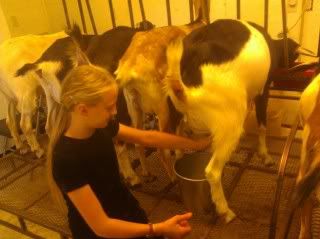At the heart of the local food movement movement is the understanding that buying locally grown and produced food is superior. It is fresher, it does not violate the environment via thousands of miles of transport. It supports the local farmer, helps maintain green space, agricultural land around our cities. It keeps food dollars in the community, rather than sending them to a behemoth retailer headquartered in another state, and further yet, to food producers spread across the globe.
We pride ourselves on being not only the cheesemakers, but also the milk producers. Ours is true farmstead cheese, in other words, the cheese is made on the premises of the farm that the milk comes from. . This is somewhat limiting, when we do not have milk, we cannot make cheese (or yogurt or kefir, etc). It is definitely more work, for in addition to making the cheese we have all of the labor of running a farm to tend to as well--raising baby animals, feeding animals and the four hours a day, every single day of the year that we are milking the goats. We do it, however, because we believe that it is the right thing to do. There are others who buy milk from other producers and make very nice cheese, but they are not the "farmer". They may be very nice people, they are in all likelihood doing the best that they can given their particular life situations, but they are not the farmer, they are, in our opinion, simply an upscale option for cheese buying.
It is difficult not to get frustrated when considering how this impacts us. We sell--sometimes side by side at market--a product that may look very much the same as that made by someone who is not a farmer/cheesemaker. The buying public often thinks that the cheesemaker who buys their milk is the farmer. Some take care to differentiate that they are not the farmer, that they buy their milk from several farmers, however many do not. We have heard cheesemakers asked by would-be customers where the milk comes from and their answer is "I have a farm outside of town..." without being clear that this is a "farm outside of town where I buy my milk" rather than "a farm outside of town where I milk the goats..." We are constrained by the reality that we can only milk so many goats. We are blessed in that we have many hands to help milk, but the reality is that our land can only support so many, we can only responsibly own a certain number of goats. Someone buying milk is limited only by how far they are willing to drive (or can convince the farmer to drive). They can potentially make double, triple or even quadruple the cheese that the farmer will have the time, energy and milk to make. The realities of supply and demand further mean that they will have the bulk needed to be able to broker deals with stores and restaurants that the true farmstead cheese maker cannot.
The biggest frustration comes weekly when the farmer treks to the feed store. Our goats' grocery bill is regularly much higher than that of our family. When discussing milk prices recently with a friend who sells milk to local cheesemakers we had a sinking feeling when we realized that if we bought all of our milk from one of several milk suppliers in the area that not only would we be saving those four hours of milking time daily, plus the work of raising animals (we could even live in an apartment in the city!) but that to buy milk, our most basic "ingredient", would cost us half as much as buying feed for the goats.
Half as much.
The milk with which we make our cheese costs twice as much as bought milk would cost, when figured by the feed it takes to produce each gallon of milk.
At least three times as much labor goes into producing the end product because we do not buy the milk from others.
And yet every week at market (or when talking to a store or restaurant) we are questioned as to why our prices are so much higher than "so-and-so's cheese". After all, it is the same basic product, right? Nearly every week, despite our higher prices, we face the realization that there is no way that we can compete with the prices offered by those who do not have to stay up all night worried about a milker in labor, drag themselves out to milk at 6AM despite a raging migraine or lay awake when it rains, worried about the goat's shelter. Nearly every week, it seems, we stare at the prices posted on the wall at the feed store and wonder how high the prices can possibly go?
We simply can't compete.
So why do we do this?
*So that our kids learn the wonder of holding a brand new wet baby goat nuzzling their neck.
*Because when you have that migraine who better to share it with than your spouse and children?
*Because it is satisfying beyond description to see the process from woods and field to dairy to creamery.
*We get to share country life with visitors to the farm.
*We get to see anew each Spring the promise of abundance after the want of Winter.
*Because we get to share in a tradition as old as humankind.
*So that we do not have to sit in a soul-killing office daily after a peace-killing commute. (that one's for Tim!)
*Because it means a lot to us to be the farmer that provides the food, not just a manufactured food producer.
*Because we feel that it represents the purest form of local dairy production.
It would just be nice to have the differences recognized.
There are several dairies in our area that hold to the same beliefs and practices and this "rant" is not at all directed towards them. There are likewise some cheesemakers who buy rather than produce their milk and are very clear up front about the fact that they do so. We appreciate this greatly. The reality is that everyone will have a different business model and due to lifestyle demands, everyone will have different assets. Not everyone has a cadre of milkers, as we do at Swede Farm. Not everyone has an outside income or low cost milk source to subsidize their prices as many other cheesemakers do. There are wonderful farmers that we know who chose to supplement their income by selling milk to cheesemakers and we fully support them in this. Our concern is not with the particular business model a cheesemaker or farmer may adopt, our frustration arises with a lack of understanding or appreciation on the part of the consumer of the differences. The biggest burden will always rest on the consumer.. If you are in the habit of buying locally produced cheese, learn who is actually producing farmstead cheese and seriously consider buying from them. If there is a significant price discrepancy between cheese makers, consider why this could be. Some customers are looking for high quality locally made cheese, regardless of the farmstead nature. Thankfully there are usually many such options for this kind of consumer. If your interest is in supporting the farmer cheesemaker, there are less options. Be aware of the challenges facing farmer/cheesemakers and show your appreciation by giving them your business. They will appreciate it.





2 comments:
The only solution I see is to grow your own goat food. The first step: Get a million dollars and buy some land.
Bruce's comment reminds me of something I heard a long time ago:
Q. What's the easiest way to get a small fortune?
Most people will suggest bank robbery, lottery, joining the Mob, etc; nope, there is a simpler answer:
A. Start with a Large Fortune!
Post a Comment